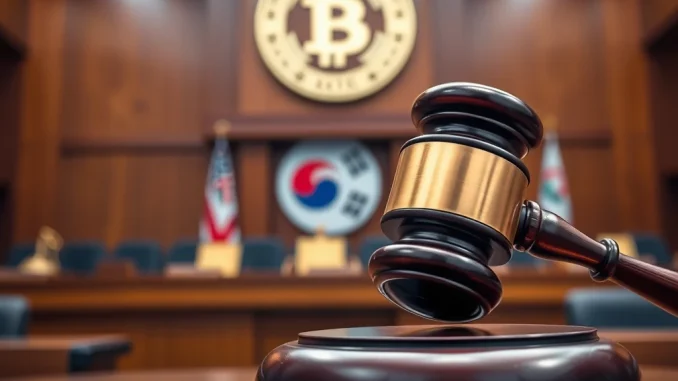
The world of politics and cryptocurrency continues to intersect, often bringing complex legal challenges. In South Korea, a notable case involving former Democratic Party lawmaker Kim Nam-kuk highlights the growing scrutiny on officials’ financial holdings, particularly digital assets. This situation centers on allegations surrounding undisclosed cryptocurrency, leading to significant legal proceedings that capture public attention.
What’s Happening with the Korean Lawmaker?
Former Korean lawmaker Kim Nam-kuk is preparing for an appellate court trial scheduled for July 17. The case stems from accusations that he intentionally failed to disclose his cryptocurrency holdings in his financial statements during his tenure as a member of parliament in 2021 and 2022. Financial disclosure is a standard requirement for public officials, designed to ensure transparency and prevent conflicts of interest. The inclusion of digital assets in these disclosures has become a point of contention as the crypto market has grown.
Here’s a quick look at the situation:
- **The Accusation:** Kim Nam-kuk allegedly omitted virtual assets from his mandatory financial disclosures.
- **Initial Trial Outcome:** He was acquitted in the first trial held in February.
- **Current Status:** The prosecution has appealed the acquittal, leading to the upcoming appellate court trial.
- **Parallel Development:** Despite the ongoing legal process, he has reportedly been appointed as a digital communication secretary in President Lee Jae-myung’s office, a move that has drawn criticism given the circumstances.
Why is Crypto Disclosure for Politicians Important?
The case of the former Korean lawmaker underscores the critical need for clear and enforced financial disclosure rules covering digital assets. As cryptocurrency becomes more integrated into the global financial system, public officials holding significant amounts of crypto could face potential conflicts of interest. For instance, their personal holdings could influence policy decisions regarding cryptocurrency regulation, taxation, or adoption.
Transparent financial disclosure builds public trust. When officials are open about their assets, it reduces suspicion of insider trading or using their position for personal financial gain. The challenges lie in defining what assets must be disclosed, how they should be valued, and ensuring compliance in a rapidly evolving digital landscape like South Korea‘s vibrant tech scene.
The Legal Battle: Acquittal to Appeal
The initial acquittal of Kim Nam-kuk in February suggests the court found insufficient evidence or a legal loophole regarding the allegations of concealing cryptocurrency. Legal cases involving digital assets can be complex due to the pseudonymous nature of some transactions, the difficulty in tracing ownership across various platforms, and the lack of clear legal precedents. The prosecution’s decision to appeal indicates they believe there are grounds to overturn the initial verdict, perhaps based on a different interpretation of disclosure laws or new evidence.
The upcoming trial on July 17 will re-examine the evidence and legal arguments. The outcome could set a precedent for how South Korea‘s legal system handles cases involving undisclosed crypto, potentially influencing future legislation and enforcement related to public officials’ financial reporting.
What are the Implications for South Korea Crypto Regulation?
This high-profile case involving a former Korean lawmaker could accelerate discussions around strengthening crypto disclosure rules for public servants. Policymakers might feel increased pressure to clarify reporting requirements for digital assets, potentially lowering disclosure thresholds or mandating more detailed information about holdings and transactions. Stricter financial disclosure rules could enhance transparency and accountability in the political sphere.
Conversely, overly strict or unclear regulations could create compliance burdens or raise privacy concerns. Finding the right balance is crucial for fostering a transparent political environment without stifling innovation or participation. The outcome of the appeal may provide further impetus for legislative action in this area.
The Controversy Around Kim Nam-kuk’s New Role
Adding another layer of complexity, reports indicate that Kim Nam-kuk has been appointed as a digital communication secretary in President Lee Jae-myung’s office. This appointment comes while he is still facing an appeal over serious allegations related to his financial disclosure and cryptocurrency holdings. Such appointments during ongoing legal battles often spark public debate about ethics, accountability, and the standards expected of individuals in positions of influence. Critics argue that the appointment sends a negative message about the seriousness with which the allegations are being treated, despite the initial acquittal.
Looking Ahead: What to Expect on July 17
The appellate court trial on July 17 will be a key moment in this case. The court will review the facts and the law to determine if the initial acquittal was correct or if Kim Nam-kuk should be found guilty of intentionally omitting his virtual assets. The proceedings will likely focus on the interpretation of existing financial disclosure laws as they apply to cryptocurrency and the evidence presented regarding his holdings and intent.
The outcome could have significant repercussions, not only for Kim Nam-kuk’s career but also for the broader landscape of political accountability and crypto disclosure requirements in South Korea. It serves as a reminder that as digital assets become mainstream, legal and ethical frameworks must adapt to ensure transparency, especially for those in public service.
Summary
The case of former Korean lawmaker Kim Nam-kuk facing an appeal over undisclosed cryptocurrency highlights the evolving challenges at the intersection of politics, finance, and technology. His upcoming trial on July 17 will revisit allegations of intentionally omitting virtual assets from his financial disclosure statements while in office. Despite an initial acquittal, the prosecution’s appeal keeps the legal battle alive. The controversy is amplified by his reported appointment to a new role amidst these proceedings. This situation underscores the increasing importance of clear crypto disclosure rules for public officials and could influence future regulations and standards of accountability in South Korea‘s political landscape.



